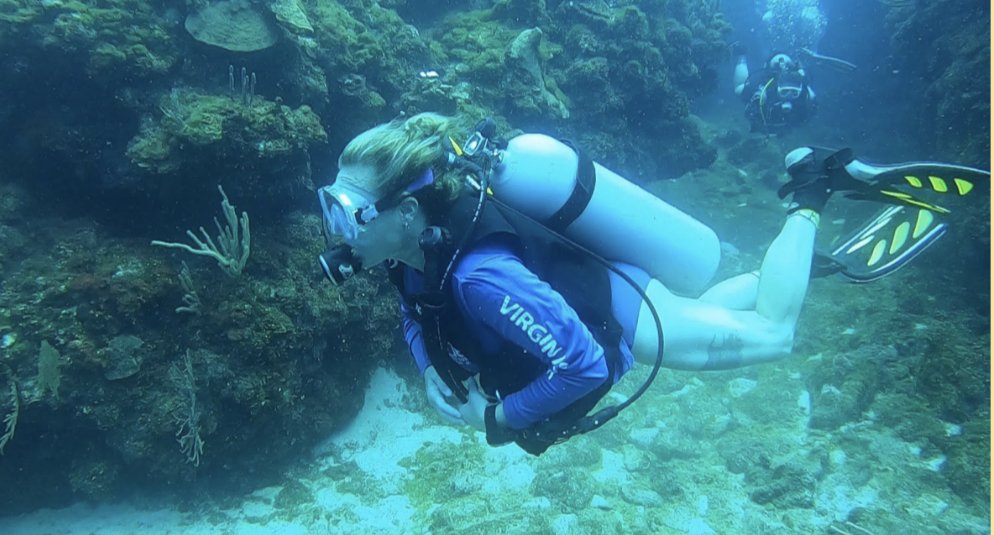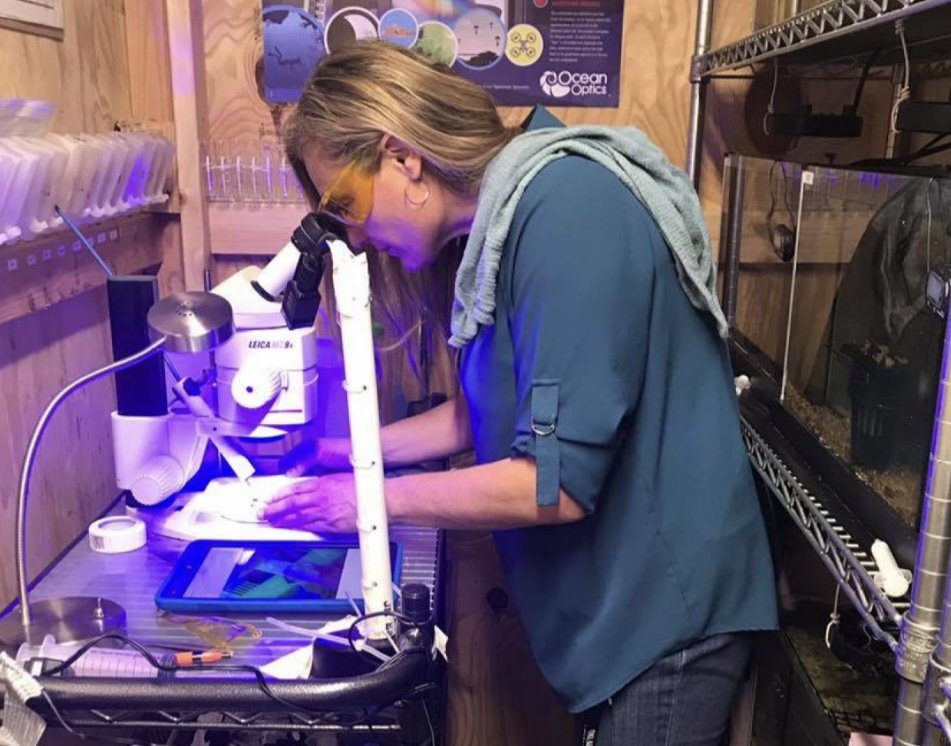Green Trojan: Dive into Marine Conservation with Dr. Ann Money
Headshot of Dr. Ann Money. (Courtesy of Dr. Money)
By Sara Moreno
Dr. Ann Money, the driving force behind our local aquarium, has a story as deep and captivating as the oceans she explores. In our recent interview, we explored Dr. Money's illustrious career, world-renowned research published across multiple platforms, and fervent advocacy for environmental awareness. Beyond her role in the aquarium, she serves on the board of the Sustainability Alliance and actively engages with the local Jenks Chamber of Commerce. Her community involvement extends to hosting educational tours, introducing visitors to the captivating world of sharks while subtly intertwining the message of sustainability.
Dr. Money's venture into marine biology originates far from the landlocked state of Oklahoma. Originating in the Washington, DC area, surrounded by the Chesapeake Bay, her initial aspirations leaned towards environmental biology. However, life took an unexpected turn as each job she landed after college led her deeper into marine territory.
"I wanted to be an environmental biologist. And every job I got, out of college, was all marine,” said Dr. Money.
Dr. Money explores the world's oceans through scuba, an activity that has shaped her career.
Image courtesy of Dr. Money.
The realization struck her that a significant 71% of the planet is cloaked in water, prompting a shift in her perspective. It dawned on her that studying the ocean could maximize her environmental impact. Driven by this revelation, she delved into the intricate world of coral reefs, especially in the last eight years, recognizing their precarious state with a 50% loss.
"Why marine biology? Well, 25% of all marine life lives on a reef, and they only make up 0.1% of the planet," said Dr. Money, underlining the critical importance of these ecosystems.
The spotlight turned to the awe-inspiring shark exhibit, where Dr. Money's pride in the uniqueness of the collection shone through.
"We are the only place in the Western Hemisphere where you can come and see bull sharks in an aquarium," said Dr. Money.
Her dedication to marine research extends beyond traditional boundaries. The ongoing work with a company called Iron Skin exemplifies the practical applications of her research. This collaboration aims to develop a shark-resistant wetsuit.
"Sharks right here in the Tulsa Metro save lives around the world," said Dr. Money, emphasizing the broader impact of local research on a global scale.
Other organizations such as the National Oceanic and Atmospheric Administration also come to the aquarium to reap the benefits of the phenomenal shark exhibit.
Our exploration took a deep dive into Dr. Money's love of marine biology. Her journey includes unforgettable experiences, from working on fishing boats in Alaska to helping baby sea turtles get to shore after hatching.
“And then would go down to Florida and release them and acclimate them in an open water pan, and then release them into the wild so they had a much better chance for survival,” said Dr. Money.
Early on in her career, Dr. Money worked with the National Marine Fishery Service and the Protected Species Branch.
Delving into her groundbreaking research on coral fluorescence, we uncovered the potential to reshape our understanding of coral resilience.
"The first time I saw fluorescence for myself underwater, it was in Bonaire, and it changed my life," said Dr. Money.
This revelation led to her current collaboration with a geneticist in Colorado who works with CRISPR technology.
This image depicts Dr. Money conducting her Coral Fluorescence research at her Oklahoma Aquarium.
Image courtesy of Dr. Money
“We are looking at genetically modifying the fluorescent protein, not the coral itself, but the fluorescent protein within the coral to basically shine brighter, to have a greater emission, so that, perhaps, it can attract algae faster,” said Dr. Money.
Dr. Ann Money's groundbreaking research on Bio-Fluorescence in Coral Reefs has garnered resounding praise from esteemed colleagues, showcasing the significance and potential impact of her innovative project.
Lynne S. Wilcox, MD, MPH, a Consulting Medical Epidemiologist, underscored the vital role of Dr. Money's research in coral conservation, stating, "Ann Money’s research addresses gaps in our understanding of the functional relevance of coral fluorescence, and she is uniquely suited to both contribute to the scientific literature on this topic and inspire a new generation of scientists and citizens to conserve the resources of the oceans."
Bret S. Danilowicz, Dean and Professor of Integrative Biology at Oklahoma State University, commended Dr. Money's unique expertise, stating, "With her experience and the facilities already available to her, Dr. Money is well positioned to make this a successful research project."
These testimonials collectively affirm the profound impact and importance of Dr. Ann Money's research, reinforcing the urgency of supporting her pioneering efforts in Bio-Fluorescence to safeguard the future of coral reefs worldwide.
Away from laboratories and boardrooms, Dr. Money's scuba diving experiences have played a pivotal role in her career.
"Diving is what grounds me and reminds me why I do what I do," said Dr. Money.
Her scuba diving adventures, from witnessing baby turtles making their way to the ocean to the mesmerizing fluorescence in Bonaire, have provided not just data but a profound connection with the underwater world. This personal connection with the marine environment fuels her passion for conservation.
As we delved into her journey as a woman in a male-dominated field, Dr. Money emphasized the importance of diversity in STEM fields.
"Kids need to see people who they can relate to, who look like them in the sciences," said Dr. Money.
The need for more women in science is critical to inspire the younger generation and break down stereotypes. Dr. Money serves as a testament to breaking barriers in science, challenging stereotypes, and encouraging inclusivity.
Dr. Money teaches a group of young girls about coral fluorescence.
Courtesy of Dr. Money.
In concluding our conversation, Dr. Money's words echoed with a call to depoliticize environmental issues.
"It shouldn't be political. The more we can do that, we can take it out of the political realm and make it just a human issue," said Dr. Money.
This emphasis on collective responsibility underscores the shared duty we all have in preserving our planet for future generations. Dr. Money's journey is not just a narrative of scientific exploration but a call to action for everyone to become stewards of our oceans and the environment.



